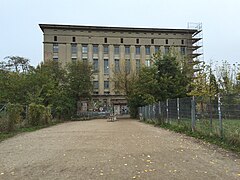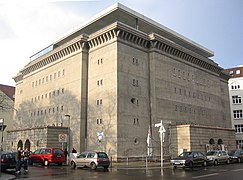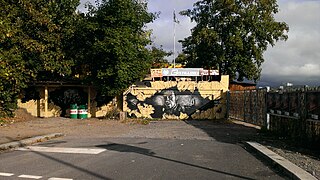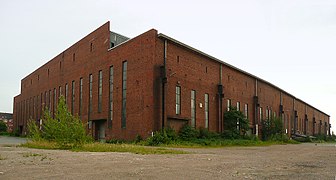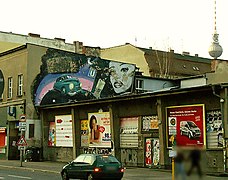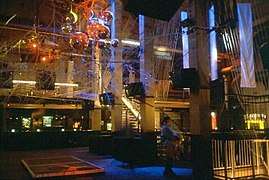Techno club
A techno club is the special form of a discotheque in which only techno or electronic music is played. Techno clubs often claim to be less commercial than major events and focus on the scene.
Most clubs have permanent resident DJs who play there at regular intervals and help shape the club's image and musical style . In addition, guest DJs occasionally play. International stars of the scene (e.g. Sven Väth , Richie Hawtin , WestBam ) often appear in the more well-known techno clubs .
In contrast to traditional discos, empty industrial, factory and warehouse halls are often popular in the techno scene. The clubs are often named after the previous purpose of the premises, such as vaults (vaults of the Wertheim department store), bunkers, raw material stores or electrical works.
However, the transition to conventional discotheques is rather fluid, as techno events take place more or less regularly, especially in many large discotheques.
In addition to several dance floors in some cases, most clubs have a so-called chill-out area, which should offer guests seating and a relaxing atmosphere.
Technoclub series of events
Technoclub is also the name of a successful series of events (and the associated sound carrier compilations ) by the German music producer and DJ Talla 2XLC .
history
The warehouse in Chicago opened in 1977 and established itself in the early 1980s as the first club to play mainly house and electronic music . In West Berlin , the first acid house parties took place in the UFO from 1988 in the ambience of later classical techno clubs. Immediately after reunification, the first influential techno clubs emerged, especially in the east of the city, with the emergence of the techno scene . The planet and its successor E-Werk , the safe and the bunker were formative at this time . In 1988 the Omen opened in Frankfurt am Main and, under the operator and resident DJ Sven Väth, quickly developed into an international meeting place in the Rhine-Main area .
The first after- hour clubs such as the Walfisch or the Exit in Berlin quickly emerged , which only open in the early morning hours and are linked to nightly events.
While the various varieties of techno drifted apart in the course of the 1990s, the first clubs that focused on individual branches also opened. For example, the Milk! on Drum and Bass and the Natraj Temple on Goa .
Well-known techno clubs
Former clubs
- Butane Club (Wuppertal, 1999-2018)
- Cocoon Club (Frankfurt am Main, 2004–2012)
- Cyberhouse (Hanover, 1993–1998)
- Dorian Gray (Frankfurt am Main, 1978-2000)
- E-Werk (Berlin, 1993–1997)
- Hacienda (Manchester, 1982-1997)
- KW - the heating power plant (Munich, 1996-2003)
- MMA Club (Munich, 2014-2019)
- Natraj Temple (Munich, 1996-2008)
- Omen (Frankfurt am Main, 1988–1998)
- Oxa (Zurich, 1985-2013)
- Palazzo (Bingen, 1990-2003)
- Raw materials warehouse (Zurich, 1997–2010)
- Stammheim (Kassel, 1994-2002)
- Engine (Dresden, 2002–2014)
- U60311 (Frankfurt am Main, 1998–2012)
- Ultrasound (Munich, 1994-2003)
- Warehouse (Chicago, 1977–1982)
- Zoom (Nuremberg, 2001–2010)
Active clubs
- About Blank (Berlin, since 2010)
- Airport (Würzburg, since 1983)
- Berghain (Berlin, since 2004)
- Blitz Club (Munich, since 2017)
- Distillery (Leipzig, since 1992)
- The rocket (Nuremberg, since 2003)
- Fabric (London, since 1999)
- Grelle Forelle (Vienna, since 2011)
- Harry Klein (Munich, since 2003)
- KitKatClub (Berlin, since 1994)
- Robert Johnson (Offenbach, since 1999)
- Rote Sonne (Munich, since 2005)
- Technoclub (Frankfurt am Main, since 1984)
- Tresor (Berlin, since 1991)
- Tunnel (Hamburg, since 1993)
- gallery
Web links
- Map of Germany "Legendary Clubs" No. 49/2017 by ZEITmagazin, December 6, 2017
Individual evidence
- ↑ Afterhour - Electronic Music in Nuremberg on medienwerkstatt-franken.de, from 2019, accessed on April 14, 2020
- ↑ The rocket - international top 10! on curt.de, February 16, 2014, accessed April 13, 2020


